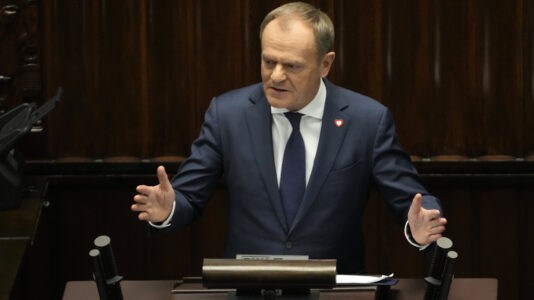The German Christian Democratic Union (CDU) is seeking to regain power, and a large part of that process entails breaking away from Angela Merkel’s policies which for so long defined the party — or at least giving the public that perception.
As a part of this strategy, the party has adopted a new program at its most recent party congress, with the new 70-page policy document replacing the previous one, which is now 16 years old and has been outdated. However, although the party has re-emerged as Germany’s strongest party after its electoral defeat in 2021, it still champions mass immigration, has adopted many of the left-wing cultural values of its rivals, and rabidly attacks conservatives across Europe, namely Hungary’s Viktor Orbán.
The CDU knows, however, that the public is fed up with immigration and other left-liberal cultural values, and is working to redefine their positions on the most pressing issues facing Germany. As a result, the party is focusing on asylum policy, relations with Islam, energy policy, climate protection, and last but not least, the country’s security. While the program contains objectives that can only be achieved gradually, it is clear that they reflect a desire to regain government power.
On the first day of the congress, 68-year-old Friedrich Merz was re-elected president, having already left no doubt about his clear ambitions as chancellor ahead of next autumn’s parliamentary elections, according to Hungarian news outlet InfoStart.
Not for the first time, Merz has sharply criticized former Christian Democrat Chancellor Angela Merkel. This time, he said that during the 16-year reign of Germany’s first female chancellor, the CDU had lost its profile and that voters needed to be offered new alternatives.
“They need to know who we are, where we stand and what we want,” Merz was quoted by German media.
However, there is much to doubt about the CDU, as the party prepares to form an alliance with one of the left-wing parties that currently control Germany, a point the rival Alternative for Germany (AfD) has been making consistently. The CDU has ruled out an alliance with the AfD, which means the Greens, the SPD, and the FDP are the most likely partners in a new ruling government. In short, that means more mass immigration and more left-leaning policies that many of the CDU’s own voters reject, as the CDU will have to make major concessions to avoid an alliance with the AfD, which in theory should be its natural partner.
Nevertheless, the CDU is trying to at least provide the image that it is moving in a new direction. The party’s new program reaffirmed its commitment to the “German dominant culture,” the so-called Leitkultur, which the party says applies to both refugee policy and the relationship with Islam. These are the two main areas of crisis that have caused many problems for Germany in recent years and have led to sharp political debates.
In its new manifesto, the CDU has taken a strong stance in favor of tightening refugee policy, including restrictions on the admission of refugees. On the latter, it has backed the recently adopted “Rwandan model” in the U.K., stressing that the admission of new refugees should be decided in a safe third country.
The proposal has reportedly provoked much controversy with Germany, but as with other provisions put forward by the CDU, the so-called “Rwanda model” is mostly for show. For one thing, the U.K. has struggled for years to implement it, with courts routinely striking it down and NGO lawyers working around the clock to render it ineffective. Even if the U.K. can finally get the model off the ground, it is unlikely to have much impact on immigration, as it is not even clear how many migrants Rwanda can effectively take in, with many experts claiming it will only amount to hundreds.
Second, there are various legal provisions at the EU level that make such a Rwanda plan virtually impossible for Germany to carry out — not to mention the various court battles that would rage within Germany itself.
Regarding the relationship with Islam, Merz himself had previously stated that Muslims are part of Germany’s diversity. However, the program stressed that whoever wants to live in Germany must recognize the dominant culture, respect for the dignity of all human beings, fundamental human rights, the rule of law, and tolerance.
On security, the CDU’s new program calls for a gradual roll-back towards general conscription, which was suspended in 2011. The CDU has also aligned itself with the Greens on security and foreign policy, arguing for more weapons for Ukraine and a transatlanticist view on foreign policy, which some experts have argued is how the CDU will later argue is the basis for forming a coalition with the left-wing party.
A similar alliance exists in Austria, where the ruling Austrian People’s Party (ÖVP) rules with the Green party. On the state level in Germany, the CDU currently rules with the Greens as well, which could later serve as a template for such a coalition at the federal level.





